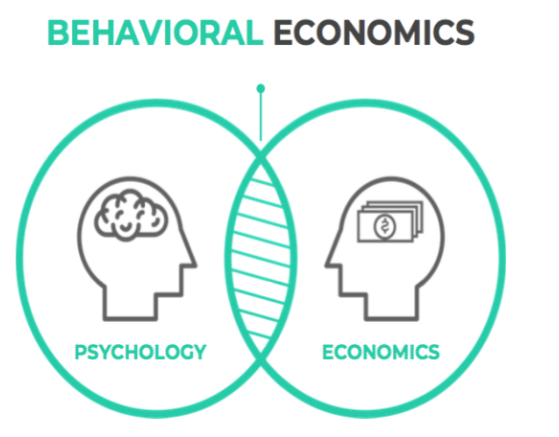Construct the methodology for behavior and experimental economic research
Introduction
Behavioral and experimental economics are actually a part of economics. They are actually a part of the emerging research programme and are not based on the assumptions of the previous neoclassical economics research programme. The two, behavioral and experimental economics research originate from the phycology with primarily emphasizing on criticizing homo economic[1].

Apart from criticizing, behavioral economics is also making attempts to include certain behavioral assumptions in the new models of human action. On the other hand, the classical approaches have their orientation towards the periphery of economics such that it rejects the basic neoclassical principles instead of making an attempt to change them. These approaches insist on finding an alternative branch of economics which has close association with other social sciences.

Figure 1 Behavioral economics
Difference between behavioral and experimental economics
Behavioral economics actually tries to make economics a much adaptable and powerful science that can explain human behaviour. It is done with the help of two different but related branches of science, psychology and social science. The insights from the two branches are collectively included into economics for understanding human behaviour. Contrary to this, experimental economics uses methods that are developed in the natural sciences to grab an understanding of human behaviour. The experimental economic research is actually helpful in identifying the outcomes of integrating the different insights from other branches such as psychology and social science and knowing that up to what extent can they be useful[2].
Both behavioural and experimental economics are novel fields of research in economics and bring up many issues in economics[3]. Despite its recent evolution, its ability to handle and explain the different issues in economics has brought widespread recognition in the recent years.
Behavioural economics aims to describe humans in a much more realistic way, optimizing the outcomes obtained from economic model[4]. Contrary to it, experimental economics is an approach that uses experiments to gather answers to the important questions in economics.
Methodology
The methodology for behavioural economics is categorized into following:
• Lab empirics (experiments)
• Field empirics
• Theory
Lab empirics: Lab empirics or experiments describe the authenticity of the results gathered. They explain the suitability of the specific or general model being used and also explain the association of the results gathered with the real time scenario.
Field empirics: Contrary to the lab empirics, field empirics represent high dependence on associating the results with real time scenario and low dependence on the usual model being used.
Contrary to the lab experiments, in the field experiments it is difficult to know about the reasons of occurrence of certain phenomena.
Theory: It is necessary to identify the different predictions so as not to accept the ongoing trends. It should not be that the candidate does not give importance or does not consider the rational explanations. On the other hand, rational explanations should not be accepted casually. One should understand them carefully.
Interesting Blog: Macro-Economic Challenge In The Global Economy-Possible Research Areas For Your Postgraduate Economic Dissertation
Contribution of field and lab experiments to economics
The experimental approach is based on creating theories that can be tested on the behaviour of economic agents[5]. While there are several statistical tools that identify certain theories by making use of data observed, in some cases the data does not accept all the assumptions that are necessary to perform the experiments.
Similar to behavioural economics, the methodology of experimental economics also considers field and lab experiments. Experimental economics is actually helpful in identifying the existing theories and rectifying the false ones. This helps to optimize the new insights for advancing the economic theory and aims at improving the policy recommendations. Experimental economics was previously limited and now has spread its area in different fields of economics, such as political economy, public economy etc.
Summary
From the above discussion, it can be asserted that both behavioural and experimental economics research are gaining widespread recognition due to their efficiency and usefulness in the field of economics. While behavioural economics aims at understanding the behaviour of humans, the experimental economics research is based on conducting experiments for validating the existing or classical theories. It aims at rectifying the classical theories and developing new theories on the basis of experiments conducted. The behavioural economics integrates the ideas from psychology and social sciences to understand and model the human behaviour in a better way. Many scholars are attracted towards this branch of economics and have published their works in the field of behavioural and experimental economics.
Tutors India offers Economics dissertation topics on Micro and Macroeconomics, International Economy, Financial Economics, Labour and Demographic Economics and others.
References:
[1] Strickland, J. C., & Lacy, R. T. (2020). Behavioral economic demand as a unifying language for addiction science: Promoting collaboration and integration of animal and human models. Experimental and clinical psychopharmacology, 28(4), 404.
[2]Tom Lane. How Does Happiness Relate to Economic Behavior? A Review of the Literature. Journal of Behavioral and Experimental Economics, Volume 68.
[3] Kelsey C Hample. Experimental Methodology: Assigning pro-social groups in the lab. Journal of Behavioral and Experimental Economics, Volume 88, October 2020.
[4] Santos, Ana. (2011). Behavioural and experimental economics: Are they really transforming economics?. Cambridge Journal of Economics. 35. 705-728. 10.1093/cje/beq049.
[5] Shastitko, Anastasia. (2017). Behavioral Economics: Application of the Methods of Cognitive Psychology to Economics. Social Sciences. 48. 142-151. 10.21557/SSC.48907824.

 Previous Post
Previous Post Next Post
Next Post